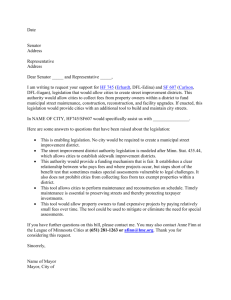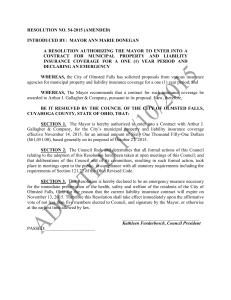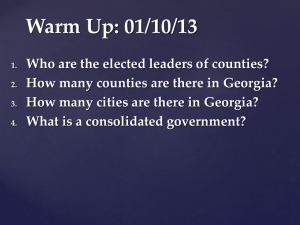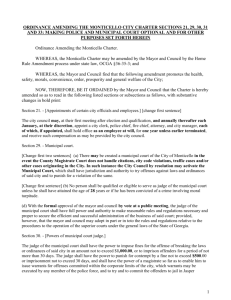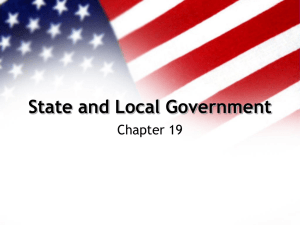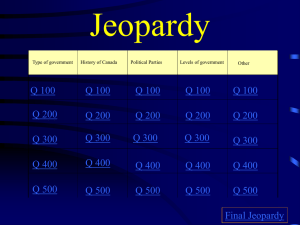3-6
advertisement
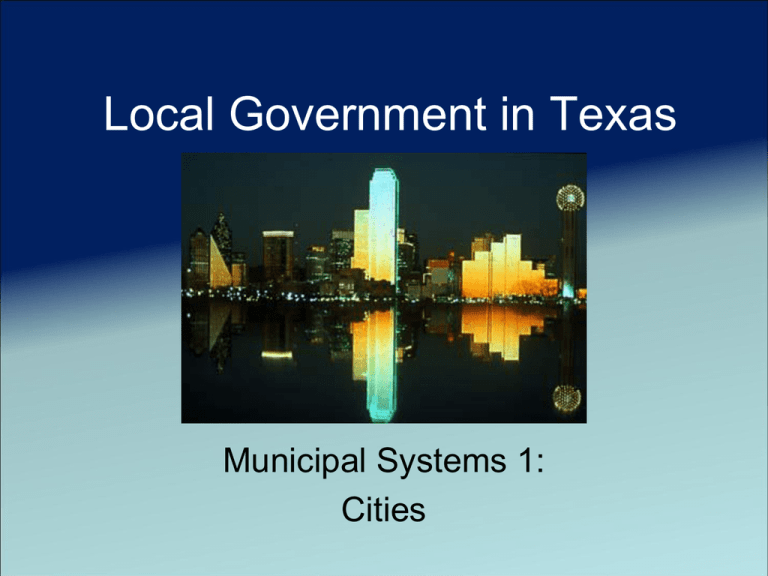
Local Government in Texas Municipal Systems 1: Cities The Unitary State • In unitary states, authority flows generally downward Central Government – Citizens elect state gov’t – States develop and administer policy either • Directly to citizens, • Or indirectly through counties • These policies are generally uniform throughout the state: the ‘general law’ • Another system to develop and administer policy specific to individual communities: – Municipal government • Cities • Special Districts County A City County B SD SD City Citizens County C City City Citizens Citizens Classes of Cities in Texas • General Law cities – Equivalent to unincorporated towns and townships in other states – Typically cities with populations under 5000 – No city charter – Structure established by the Local Government Code – Only state and federal taxes apply – Unable to provide most municipal services – Number of General Law Cities in Texas: 895 Structure of General Law Cities Resident Voters Board of Aldermen Mayor Public Works Officer City Secretary Municipal Judge Municipal Court Clerk Appointed City Offices Chief of Police Assistant Secretary For Utilities Classes of Cities in Texas • Home-Rule cities – Population > 5000 – Defined by a city charter • The constitution of a municipal government – – – – Structure of municipal government Modes of election and appointment Modes of ordinance Jurisdictional boundaries • How to get a city charter – – – – Residents of GL city assemble a charter committee Committee develops and submits proposal to resident voters If approved by voters, charter sent to State Legislature and County Clerk Recognized by the Texas Legislature – Lays and collects municipal taxes – Provides municipal services – Number of Home-Rule cities in Texas: 315 Types of Home Rule Charter • Mayor-Administrator • Mayor-Council – Strong Mayor – Weak Mayor • Council-Manager • City Commission Mayor-Administrator • The simplest form of municipal government • Exceedingly rare • Places most city power in one set of hands • Citizens elect mayor • Mayor appoints a city administrator • City administrator appoints city officers Resident Voters Mayor Appointed City Offices City Administrator Police Chief Municipal Judge Fire Chief City Clerk Public Works Weak Mayor-Council • City Charter variant of the General Law structure • City council elected by voters Resident Voters Mayor – At-large – By Place – By Precinct • Mayor may be directly elected by voters or • Elected by city council among their members • Mayor and city council choose city offices City Council Appointed City Offices Municipal Judge City Secretary Municipal Court Clerk Public Works Officer Chief of Police City Attorney Fire Chief Strong Mayor-Council • Municipal structure resembling the separation of powers principle in the federal government • Mayor has strong executive powers – Usually strong appointment power – May have veto power over city ordinances – May have initiative power • Fairly uncommon in Texas • Houston largest Texas city with a Strong Mayor government Resident Voters Mayor City Council Appointed City Offices Police Chief Municipal Court Fire Chief City Secretary Public Works Council-Manager • Most common city charter in Texas • Citizens elect City Council Resident Voters City Council (may include Mayor) – Citizens may elect a Mayor – Mayor serves as city council chair • Council appoints a city manager and a few other offices Municipal court City Manager City Attorney – City manager typically an MPA • City manager serves as actual chief executive – Appoints most city offices City Auditor City Secretary Appointed by City Council Other city offices Appointed by City Manager City Commission Resident Voters Police Commissioner Fire Commissioner Public Works Commissioner City Secretary Municipal Court • Originally developed in Galveston – hurricane of 1900 killed up to 10,000 – ¾ of Galveston destroyed – Commission charter developed to rebuild the city • Municipal equivalent of a plural executive • All major city offices directly elected in at-large elections • Abandoned by Galveston in 1919 – Turf battles – Lack of coordination among departments • Commissions still found outside Texas • Some Texas cities call their councils ‘commissions’ but are not true commissions
